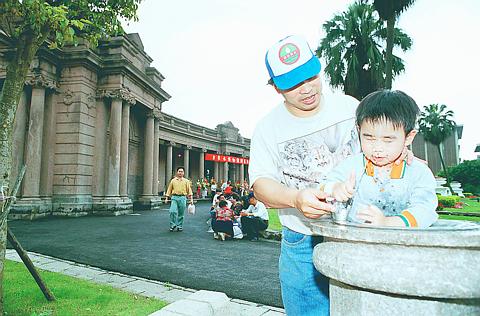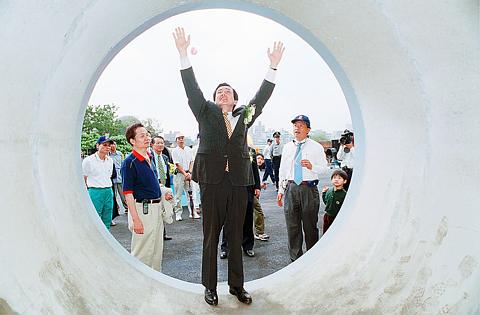Taiwan's first museum devoted to drinking water reopened yesterday to coincide with Labor Day celebration activities.
Holding a cup of tap water in his hand at yesterday's opening ceremony, Taipei City Mayor Ma Ying-jeou (馬英九) recounted a childhood anecdote.
"When I was little, I used to drink tap water without my parents' knowledge, because it was not safe to drink," he said. "Now I drink it everyday both at work and at home."

PHOTO: GEORGE TSORNG, TAIPEI TIMES
According to Ma, piped water was available in Taipei from 1885. But it was not until Taiwan's retrocession in 1945 that tap water became completely accessible to the general public -- and has now "come of age"
"Drinkable water is an indicator of modernization," Ma said.
To prove the safety of the city's water, Ma gulped down the water in the cup, then asked for more.

PHOTO: GEORGE TSORNG, TAIPEI TIMES
"Even though it's just a small cup, it takes a lot of people's efforts to make it possible," Ma said.
The reopening of the museum has historical significance.
The Baroque-style building which houses the museum was originally built in 1908, and declared a third-class historic site in 1993.
It houses nine water pumps which were used to draw off water from Hsintien River. The water was then purified at the water treatment facility before being sent on to a reservoir at Kuanyin Mountain (觀音山).
However, because of the deterioration in the quality of the water supply, the pumping facility was relocated northward to the upper stream at Chingtanyen (青潭堰) in 1977.
The water treatment facility then became the third of its kind for the city, treating 520,000 tons of water everyday.
The museum was first open in September 1993, but was shut down in 1998 for renovation.
The NT$80 million, two-year project has instilled new life in the main building and the surrounding 7,800-ping (25,740 square meter) area, which includes the water treatment facility, an outdoor equipment display area, a hillside sidewalk area, and a playground.
Tsay Huel-sheng (蔡輝昇), director general of the Taipei Water Department (台北自來水事業處), said the establishment of the museum has its own purpose.
"We would like the public to know that water is a valuable and non-replaceable natural resource," he said.
"Ninety-seven percent of the earth's water is seawater, while three percent is fresh water, but of that three percent, three-fourths of it is located in the area of the Arctic and Antarctic Poles, so that leaves us a fairly limited amount of fresh water available," Tsay said.
Tsay also cited the impressive performance of the department, citing gross revenue from January through March this year to have been registered at NT$560 million, about NT$200 million more than targeted. Tsay said he expects the number to reach NT$720 million in two months.
The Drinking Water Museum is located at No. 1, Szuyuan Street in the Kungkuan area. It is open to the public daily from 9am to 5pm. Tickets are NT$60 for adults, and NT$30 for the disabled, senior citizens, students, and soldiers. There is an additional NT$50 charge for each car and NT$150 per bus.
Those interested in visiting the facility can take advantage of the mass transit system, and get off at the Kungkuan stop. The museum is five minutes away on foot on the way to the Yungfu Bridge.

US President Donald Trump yesterday announced sweeping "reciprocal tariffs" on US trading partners, including a 32 percent tax on goods from Taiwan that is set to take effect on Wednesday. At a Rose Garden event, Trump declared a 10 percent baseline tax on imports from all countries, with the White House saying it would take effect on Saturday. Countries with larger trade surpluses with the US would face higher duties beginning on Wednesday, including Taiwan (32 percent), China (34 percent), Japan (24 percent), South Korea (25 percent), Vietnam (46 percent) and Thailand (36 percent). Canada and Mexico, the two largest US trading

AIR SUPPORT: The Ministry of National Defense thanked the US for the delivery, adding that it was an indicator of the White House’s commitment to the Taiwan Relations Act Deputy Minister of National Defense Po Horng-huei (柏鴻輝) and Representative to the US Alexander Yui on Friday attended a delivery ceremony for the first of Taiwan’s long-awaited 66 F-16C/D Block 70 jets at a Lockheed Martin Corp factory in Greenville, South Carolina. “We are so proud to be the global home of the F-16 and to support Taiwan’s air defense capabilities,” US Representative William Timmons wrote on X, alongside a photograph of Taiwanese and US officials at the event. The F-16C/D Block 70 jets Taiwan ordered have the same capabilities as aircraft that had been upgraded to F-16Vs. The batch of Lockheed Martin

GRIDLOCK: The National Fire Agency’s Special Search and Rescue team is on standby to travel to the countries to help out with the rescue effort A powerful earthquake rocked Myanmar and neighboring Thailand yesterday, killing at least three people in Bangkok and burying dozens when a high-rise building under construction collapsed. Footage shared on social media from Myanmar’s second-largest city showed widespread destruction, raising fears that many were trapped under the rubble or killed. The magnitude 7.7 earthquake, with an epicenter near Mandalay in Myanmar, struck at midday and was followed by a strong magnitude 6.4 aftershock. The extent of death, injury and destruction — especially in Myanmar, which is embroiled in a civil war and where information is tightly controlled at the best of times —

China's military today said it began joint army, navy and rocket force exercises around Taiwan to "serve as a stern warning and powerful deterrent against Taiwanese independence," calling President William Lai (賴清德) a "parasite." The exercises come after Lai called Beijing a "foreign hostile force" last month. More than 10 Chinese military ships approached close to Taiwan's 24 nautical mile (44.4km) contiguous zone this morning and Taiwan sent its own warships to respond, two senior Taiwanese officials said. Taiwan has not yet detected any live fire by the Chinese military so far, one of the officials said. The drills took place after US Secretary